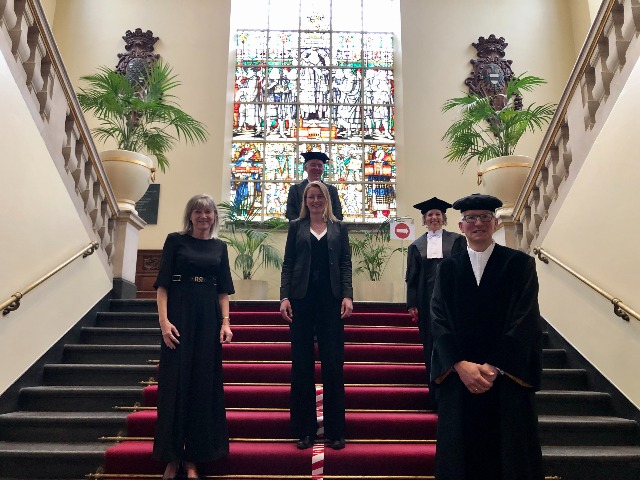Mission accomplished: first PhD student in the PhD part time programme defended her thesis
| Date: | 08 September 2021 |

In the spring of 2015, FEB Research interviewed Bianca Harms as she was the first student in FEB’s part time PhD programme. Fast forward to 8 April 2021 and Bianca defended her thesis “Native advertising: effective, deceptive, or both?” at the Academy Building. Time for FEB Research to get in touch and look back on this period.
How do you look back on this time?
“Although it has been a relatively long and sometimes strenuous process, I experienced my time as a PhD candidate at SOM very positively. Combining a part-time PhD with a challenging job and a family with three teenagers is of course demanding. And since it is a multi-year process, it is inevitable that life events take place that also have an effect on the research. This combined with some setbacks I experienced with my research projects resulted in an intensive process with many highs but also some lows. I am happy and proud that I managed to cross the finish line and I look back at an inspiring time in which I learned so much. It is surprising how the difficulties encountered have faded into the background.”
Was it difficult to combine your PhD project along with your job?
“It was sometimes difficult to combine my
PhD project along with my job at NHL Stenden University of Applied Sciences. The findings of my first explorative qualitative PhD project also resulted in a blueprint for the new to be developed professional master programme Content & Media Strategy. That I could use
the findings of my first study to set up a master programme was a wonderful and unanticipated spinoff.
As a result, I became the project leader for the development of this programme. Besides that, I was responsible for the macro-efficiency check and initial accreditation processes in the midst of my PhD process. And after the accreditation, I was assigned as the programme coordinator. The master programme was launched in 2018 and has now developed into the largest master programme from NHL Stenden.
Although I think this is a wonderful and unanticipated spin-off from my research, it also resulted in additional work load and hectic times as you can imagine. In particular when I encountered problems with my research, I could experience difficulties with prioritizing and show procrastination. Fortunately, with the great support of my fantastic supervisors Tammo Bijmolt and Janny Hoekstra, I was able to always get back on track.”
Your PhD research focuses on effectiveness of online branded content,
or native advertising. What were the results of your research project?
“When I started, I was fascinated by the steep increase in organizations that included native advertising in their marketing communication plans. In particular, since not much knowledge existed about the effectiveness of this advertising strategy. In addition, the similarity of native advertising content and editorial content fueled public and regulatory debates on its potential deceptiveness.
With three studies, my research sheds light on the potential effectiveness and deceptiveness of native advertising. Although brands engage in native advertising to positively affect their customers attitudes and behaviour, we showed that this form of advertising is not always better appreciated than traditional online advertisements.
For example, we discovered that that highly educated men value banners better than native advertisements. Since native advertising can be misleading if its persuasive intent is not transparent, especially with vulnerable target groups such as children. We studied the effects of different sponsorship disclosure types and parental mediation styles on children’s advertising literacy in the context of sponsored YouTube vlogs.
The results show, among other things, that only a combination of written and spoken sponsorship disclosure and active parental mediation increases the advertising literacy of children, while restrictive parental mediation has an opposite effect. We also discovered that the activation of advertising literacy does not affect the evaluation of the vlog, but that it does lead to stronger brand effects. The research projects resulted in publications in two international peer reviewed journals and a paper based on the third project was just resubmitted.
Overall, becoming a PhD has been one of my most rewarding career experiences, both professionally and personally. In addition to the knowledge and skills I acquired, I have been able to work with wonderful, talented people at a great University. I have presented my work at various international conferences and through that I met wonderful people and I made some great new friends.”
Has COVID-19 influenced your research or the research outcomes?
“Maybe because I was in the final stage of the PhD project but the pandemic did not negatively influence my research. To the contrary, it helped me finalizing my dissertation faster than I expected. Actually, based on my experience during the lock down, I developed a proposition in which is stated that the pandemic can lead to higher productivity due to a better focus, resulting from a more flexible timetable, reduced travel time, less distractions and a lack of conference visits.”
What are your plans for the future?
“My PhD ceremony took place very recently and after all the years as a PhD candidate, I am currently enjoying life without the pressure of a PhD project aside from my regular job, working full time as a research lecturer in marketing and coordinator of the master.
However, I love to do research so I am exploring options on how this can be combined with my job at NHL Stenden. At the end of this year I start with a study to explore the potential of a new research group in the domain of Creative Business at our faculty. This could lead to great new opportunities!”
You can read the previous interview with Bianca Harms here.

